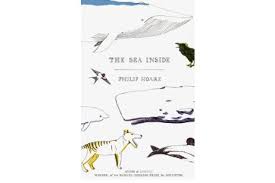The Sea Inside
Philip Hoare
Published by Fourth Estate
We are 50% water - ‘we all contain the sea inside us’ - and evolution shows that life on earth originally crawled out of the sea. But there is a theory that human beings may have emerged out of the ocean more recently than other life-forms. We still have vestigial webbed feet and fingers, almost the same ratio of fat to body mass as a dolphin, a natural instinct to hold our breath under water, and other adaptations that suggest a close connection with the mammals who live in the watery elements. Was our ancestor a ‘watery ape’?
Our relationship with the sea fascinates Philip Hoare, who swims in it every day, often before dawn, and in every type of weather. ‘The Sea Inside’ is a series of meditations on its mythologies, its biological and chemical complexity, its influence on our climate, and the importance of the oceanic eco-systems to our own survival. ‘The sea defines us,’ he writes, ‘connects us, separates us. Most of us experience only its edges, our available wilderness on a crowded island’.
Philip Hoare lives in these edgelands, on the fringes of the city of Southampton. ‘I didn’t choose to; it chose me. I might have found a more picturesque place, wild and romantic or urban and exciting; the kind of places people pass through here to reach. A port city relies on its relationship to elsewhere. Perhaps that’s why I like it so well, since it does not impose any identity on me’. Living there, he is more aware than most of the dangerous foundations we have built our civilisation on. When he cycles to the shore every morning, he passes a forest of industrial installations; ‘tapering spires for a new place of worship; circular tanks as giant igloos... silos like newly-landed space ships ... There’s no human scale to this petropolis ... it is brutal, practical, inevitable.’
In the book the author travels the world to swim with whales, explore remote shores, and record the sad history of human depredation. We are not being kind to the ocean, but we need to change our ways, because our own salvation is carried in its deepest currents.
A beautifully written book, as you'd expect from the author of Leviathon, who also lectures in creative non-fiction. It's not quite in the same league as his last, but a moving, thoughtful read.
The Sea Inside
by Philip Hoare
PS - I was horrified to find that I had to pay much, much more for the Kindle edition than the paperback - it is extortion on the part of the publisher!




